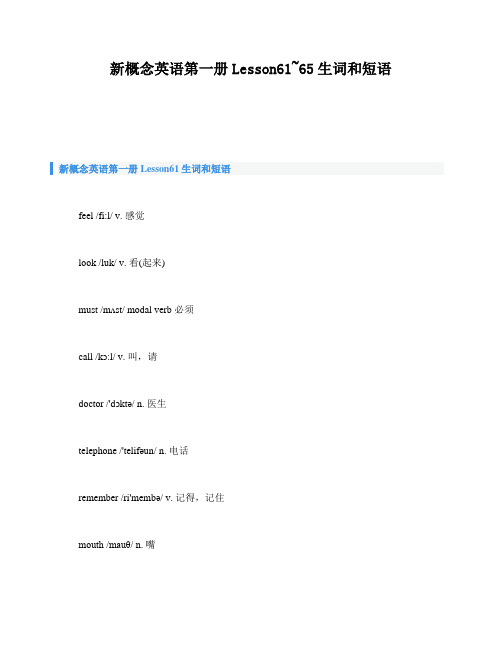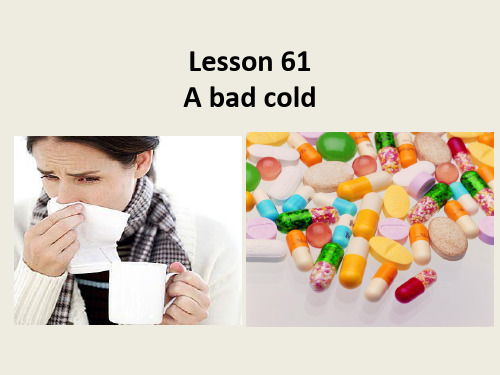新概念一册同步语法强化lesson 61-65
新概念英语第一册Lesson61_65生词和短语

新概念英语第一册Lesson61~65生词和短语新概念英语第一册Lesson61生词和短语feel /fi:l/ v. 感觉look /luk/ v. 看(起来)must /mʌst/ modal verb 必须call /kɔ:l/ v. 叫,请doctor /'dɔktə/ n. 医生telephone /'telifəun/ n. 电话remember /ri'membə/ v. 记得,记住mouth /mauθ/ n. 嘴tongue /tʌŋ/ n. 舌头bad /bæd/ adj. 坏的,严重的cold /kəuld/ n. 感冒news /nju:z/ n. 消息新概念英语第一册Lesson62生词和短语headache /'hedeik/ n. 头痛aspirin /'æsprin/ n. 阿斯匹林earache /'Iəreik/ n. 耳痛toothache /'tu:θeik/ n. 牙痛dentist /'dentist/ n. 牙医stomach ache /'stʌmək-eik/ 胃痛medicine /'medisin/ n. 药temperature /'tempərətʃə/ n. 温度flu /flu:/ n. 流行性感冒measles /'mi:zəlz/ n. 麻疹mumps /mʌmps/ n. 腮腺炎新概念英语第一册Lesson63生词和短语better /'betə/ adj. 形容词well的比较级certainly /sə:tnli/ adv. 当然get up 起床yet /jet/ adv. 还,仍rich /ritʃ/ adj. 油腻的food /fu:d/ n. 食物remain /ri'mein/ v. 保持,继续新概念英语第一册Lesson64生词和短语play /plei/ v. 玩match /mætʃ/ n. 火柴talk /tɔ:k/ v. 谈话library /'laibrəri/ n. 图书馆drive /draiv/ v. 开车so /səu/ adv. 如此地quickly /'kwikli/ adv. 快地lean out of 身体探出break /breik/ v. 打破noise /nɔiz/ n. 喧闹声新概念英语第一册Lesson65生词和短语Dad /dæd/ n. 爸(儿语)key /ki:/ n. 钥匙baby /'beibi/ n. 婴儿hear /hiə/ v.听见enjoy /in'dʒɔi/ v. 玩得快活yourself /jɔ:self/ pron. 你自己ourselves /'auɔ'selvz/ pron. 我们自已mum /mʌm/ n. 妈妈。
新概念第一册课文翻译及知识点【Lesson61、63、65】

【导语】新概念英语作为⼀套世界闻名的英语教程,以其全新的教学理念,有趣的课⽂内容和全⾯的技能训练,深受⼴⼤英语学习者的欢迎和喜爱。
为了⽅便同学们的学习,为⼤家整理了⾯的新概念第⼀册课⽂翻译及学习笔记,希望为⼤家的新概念英语学习提供帮助!Lesson61 【课⽂】 MR. WILLIAMS: Where's Jimmy? MRS. WILLIAMS: He's in bed. MR. WILLIAMS: What's the matter with him? MRS. WILLIAMS: He feels ill. MR. WILLIAMS: He looks ill. MRS. WILLIAMS: We must call the doctor. MR. WILLIAMS: Yes, we must. MR. WILLIAMS: Can you remember the doctor's telephone number? MRS. WILLIAMS: Yes. It's 09754. DOCTOR: Open your mouth, Jimmy. Show me your tongue. Say, "Ah'. MR. WILLIAMS: What's the matter with him, doctor? DOCTOR: He has a bad cold, Mr. Williams, so he must stay in bed for a week. MRS. WILLIAMS: That's good new for Jimmy. DOCTOR: Good news? Why? MR. WILLIAMS: Because he doesn't like school! 【课⽂翻译】 威廉斯先⽣:吉⽶在哪⼉? 威廉斯夫⼈:他躺在床上。
新概念第一册第61、62课

Mr. W: Can you remember the doctor’s telephone number ?
Mrs.W: Yes. It’s 09754.
情态动词can引导的一般疑问句,后跟动词原形 将划线句子改为肯定句:
in bed躺在床上;卧病在床
on the bed在床上
Mr. W:What’s the matter with He sits on the bed.他坐在床上。
him?
Mrs. W:He feels ill.
1、He feels ill.
• 结构分析: 主语+系动词(感官动词feel)+表语, 形容词ill(有病的,生病的)作表语。
Mrs.W:We must call the doctor.
Mr. W:Yes, we must.
look(感官动词)看(起来), 当look作为(实义动词)看: 与see比较: see可以表示有意识地看或碰巧看见,强调看的后果。 与watch 比较:watch可以表示看电视、比赛这种移动的画面。 例如:I can see a big monster.
They are watching TV/football match at the moment.
4、We must call the doctor.
主语
谓语
宾语
情态动词must的用法:
must是情态动词(如can),它本身没有时态或单 复数的变法,也不能够单独做谓语动词(简短回 答除外),要和动词原形一起构成句子的谓语。
Kate h__a_s_ _a__ room.T_h_e_r_e _i_s__ a computer.
新概念英语第一册Lesson61-62笔记(语法点+配套练习+答案)

请医生
have a temperature
发烧
show sb. sth.
给某人看某物
have flu
患流感
have a bad cold
得了重感冒
have measles
患麻疹
stay in bed
呆在床上
have mumps
患腮腺炎
good news
好消息
see a doctor
look +形容词
look like+n.看起来像...
Look! Some boysare playingbaseball.
快看!一些男孩在打棒球。
look at看
Look atthem(they). They look very happy.
look out of the window向窗外看
You lookunhappy.你看起来不开心。
看医生
take an aspirin
吃阿ቤተ መጻሕፍቲ ባይዱ匹林
see a dentist
看牙医
take some medicine
吃药
5、语法解析
1.have(have got)
单三形式has / has got
1有,后跟名词
2患有,后跟疾病
have a/an +单数(疾病)
have acold感冒have atemperature发烧have aheadache头疼
我一定要在半小时内完成作业吗?
No, youneedn’t.不,不需要。
call v.请,叫,打电话
call the doctor请医生
call on sb.拜访某人
新概念英语第一册第61-62课

精选ppt
24
情态动词must can’t may 表示可能性的区别
• must 一定…… 用于肯定句中,表示可能性最大; • The light is on, she must be at home now.
灯亮着,她现在一定在家。 • can’t 不可能…… 用于否定句中,表示可能性最大; • That girl can’t be Kate, I saw her in the shop just now.
• 反义词:hot 热的 • 俚语:I have cold feet. 我很紧张。
• cold n. 感冒 • have a cold 患感冒 • Do you have a cold?
你感冒了吗?
精选ppt
11
tongue 舌头
mother tongue n. 母语 e.g.. Chinese is my mother tongue. What's your mother tongue?
he must stay in bed for a week.
精选ppt
21
That's good new for Jimmy.
Good news? Why?
Because he doesn't like
school!
精选ppt
22
Grammar 语法
1. ache后缀,加在某个身体部位后表示哪儿疼
3. take the medcine 吃药
精选ppt
23
must 和 need 区别
must的意思是必须,表示主观身上的命令,以及推断。 need的意思是需要,表示客观需要。 问句: Must I stay here? 我必须得待这儿吗? No, you needn't. 不,你不必。 否定句: I mustn’t go there. 我不用去那儿 He needn’t to go there. 他不需要去那儿
新概念英语第一册 Lesson 61 – 64讲解和练习

Lesson 61 –62Ⅰ. VOCABULARY1. feel 感觉She feels tired and thirsty. It feels good to be home. We feel happy to live here.smell 闻起来taste尝起来look看起来sound听起来The food smells pleasant. The dish tastes good.He looks ill. Your idea sounds good.2. telephone 电话You are wanted on the telephone.a telephone booth电话亭 a telephone book 电话薄telephone number 电话号码make a telephone answer the phone3. remember forget 忘记1) 记得Do you still remember her name and address?2) 想起Terribly sorry, I cannot remember your name.3) remember to do sth. 记得去做某事remember doing sth 记得做过某事4. news 消息No news is good news .news 消息,新闻,只用作单数。
What’s the news for Beijing?information 资料。
信息。
不可数名词。
This is a piece of useful information.message 口信,短消息。
I am not in at the moment, please leave a message.intelligence 情报,不可数名词。
Federal Bureau of Intelligence5. headache 头痛earache, toothache,stomachache,footache6. look 看(起来)That looks like an interesting film.look at 看……东西look after照顾look down on sb.瞧不起某人look for 寻找see 看见(强调看的动作)I always see him in the park.watch 观看(看电视,电影和比赛等)They are watching a football game.7. bad 坏的,严重的,有害的Ann had a bad cold last week.be bad at 不擅长be bad for 对…..不利Somking is bad for your health.be poor at 不擅长be good at 擅长8. cold 感冒,寒冷have /catch /get a cold 感冒 a bad cold 严重的感冒Ⅱ. GRAMMAR:1、系动词的用法:动词的一种,它本身有词义,但不能单独做谓语,后面必须跟表语构成系表结构,一起充当句子的谓语。
新概念一册61到70课原文及译文

Lesson 61A bad cold 重感冒MR. WILLIAMS: Where's Jimmy? 吉米在哪儿?MRS.WILLIAMS: He's in bed. 他躺在床上。
MR.WILLIAMS: What's the matter with him? 他怎么啦?MRS.WILLIAMS: He feels ill. 他觉得不舒服。
MR.WILLIAMS: He looks ill. 他看上去是病了。
MRS.WILLIAMS: We must call the doctor. 我们得去请医生。
MR.WILLIAMS: Yes, we must. 是的,一定得请。
MR.WILLIAMS: Can you remember the doctor's telephone number?你还得医生的电话号码吗?MRS.WILLIAMS: Yes.It's 09754. 记得。
是09754。
DOCTOR: Open your mouth, Jimmy. 把嘴张开,吉米。
Show me your tongue. 让我们看看你的舌头。
Say, "Ah'. 说“啊--”MR.WILLIAMS: What's the matter with him, doctor?他得了什么病,医生?DOCTOR: He has a bad cold,Mr. Williams,他得了重感冒,威廉斯先生,so he must stay in bed for a week.因此他必须卧床一周。
MRS.WILLIAMS: That's good new for Jimmy.对吉米来说,这可是个好消息。
DOCTOR: Good news?Why? 好消息?为什么?MRS.WILLIAMS: Because he doesn't like school! 因为他不喜欢上学。
新概念第一册61课~72课语法知识点总结

61-64课:•重点句型:What’s the matter with…?用于询问他人的身体状况,医生在询问病人病情的时候常用这个表达方式。
with后面可以接人称代词,也可以接名词,如:What’s the matter with your sister?What’s the matter with Lily?What’s the matter with your cat?但要注意,with后面如果接人称代词的时候,一定要使用人称代词的宾格,如:What’s the matter with him?What’s the matter with her?和这个句型意思相同的另一种说法是:What’s wrong with…?这个说法需要注意的是:wrong前面没有the。
with后面也同样要接人称代词的宾格和名词。
•情态动词must的用法:must有“必须”、“一定”的意思,表示一种义务性或强制性,还表示强烈的劝告,如:You must finish your homework on time.(你必须按时完成作业。
)由于must是情态动词,所以它的用法和情态动词can是一样的,我们可以对照can 的用法来学习must的用法。
肯定句We must go now.否定句You mustn’t eat rich food.一般疑问句Must I clean the room now? Yes, you must. / No, you needn’t.特殊疑问句What must I do to help you?肯定句My brother can drive.否定句He can’t be at home.一般疑问句Can you help me?Yes, I can. / No, I can’t.特殊疑问句What can I do for you?通过对比,我们得知,凡是情态动词,后面都要接原形动词,在变为否定句的时候,要直接在情态动词后面加not,变为疑问句时,要把情态动词提前。
- 1、下载文档前请自行甄别文档内容的完整性,平台不提供额外的编辑、内容补充、找答案等附加服务。
- 2、"仅部分预览"的文档,不可在线预览部分如存在完整性等问题,可反馈申请退款(可完整预览的文档不适用该条件!)。
- 3、如文档侵犯您的权益,请联系客服反馈,我们会尽快为您处理(人工客服工作时间:9:00-18:30)。
Lesson 61-65核心语法1. Because he doesn’t he doesn’t like school. (L.61)2. He feels ill. He looks ill. (L.61)3. You are better now, but you mustn’t get up yet. (L.63)The boy mustn’t go to school yet. (L.63)4. He must stay in bed for another two days. (L. 63)Enjoy yourself. (L.65)We always enjoy ourselves. (L.65)语法扩展1.从属连词because引导的原因状语从句起状语作用的从句叫作状语从句。
状语从句由从属连词引导,根据从句与主句的关系,状语从句可以分为条件、地点、时间、原因、目的、结果、方式、让步以及比较等状语从句。
状语从句的位置比较灵活,可以放在句首,此时状语从句后常用逗号;也可以放在句中,此时状语从句前后用逗号与主句隔开;也可以放在句末,此时状语从句前一般不用逗号。
原因状语从句常由从属连词because, as, since, now that等引导。
其中,because 的语气最强,它引导的从句也可以回答why(为什么)所提出的问题,它所引导的从句常放在主句之后。
如:-Why is that good news for Jimmy? 为什么这对吉米来说是个好消息?-Because he doesn’t like school. 因为他不喜欢学校。
He met with an accident because he was careless in driving. 他出了事故,因为他开车不小心。
2.系动词feel和lookfeel和look可以用作系动词,后面接形容词作表语,不用被动语态。
feel指自我感觉,look 指外在表象。
如:He feels terrible. 他觉得太可怕了。
She looks beautiful. 她看上去很美。
3.mustn’t 表示禁令Don’t祈使句和mustn’t均可用来表示禁令。
用mustn’t表示禁止或不许可,语气比较强烈。
例如:Don’t take this medicine! 不要吃这个药?You mustn’t take this medicine! 你不许吃这个药!Don’t call the leader! 不要给领导打电话。
You mustn’t call the leader! 你不许给领导打电话。
Don’t talk in class!上课时不要交谈。
You mustn’t talk in class! 你不许上课时交谈。
4.介词for连接表示一段的时间作状语。
介词for后面可以接表示一段的时间,构成表示一段时间的介宾短语作状语。
如:You must stay in bed for another two days. 你必须再卧床休息两天。
He has been living here for almost ten years. 你住在这里大约有十年了。
5.反身代词。
反身代词的含义为“……自己”,一般用于强调动词的宾语与主语为同一人或事物,反身代词各个人称的词形如下表:当宾语和主语是同一人时,需要用到反身代词。
如:He cut himself when he was shaving this morning.今天早上刮胡子时,他把脸刮破了。
语法练习Ⅰ. 选择填空。
1. What’s the matter Tim?A. aboutB. ofC. toD. with2. He ill. He a headache.A. feel; haveB. feels; hasC. feels; haveD. feel; has3. You have a bad cold, so you must stay bed a few days.A. in; atB. on; inC. in; forD. on; for4. It’s really a good news us.A. forB. atC. withD. to5. He has an earache. He must an aspirin.A. visitB. watchC. takeD. see6. You look ill. You must the doctor.A. haveB. callC. callingD. take7. George has a stomach ache. He must an aspirin.A. takeB. drinkC. eatD. make8. Mum has flu. Please the room warm.A. makeB. keepC. keepingD. making9. This is the key my room.A. onB. ofC. forD. to10. Don’t lean the window, boys! It’s dangerous!A. atB. outC. ofD. out ofⅡ. 改错题。
1. You must are home before the o’clock.2. We always enjoy myself.3. Mother tells Sam, “You mustn’t play matches!”4. Jimmy doesn’t like go to school.5. I’m going to see him on ten o’clock.6. It often rains at November.7. Father is sleeping. Don’t make noise!8. Don’t drive so quick. It’s dangerous.9. Mary looks well. She is good now.10. You are ill. You must remaining in bed.III.用所给单词的适当形式填空。
1.-What's your nationality? -I'm ____________. (China)2. In the morning, Mr.Sawyer__________ to work and the children go to school.(go)3. She always eats __________ lunch at noon. (she)4. This morning Mrs. Sawyer is going to the _________. (shop)5. The children are ________ in the garden now. (play)6. I only have several small _________ of chalk. (box)7. Little Jimmy ___________ a bad cold. (have)8. The newly purchased doll __________ pretty. (look)9. You must stay in bed for another two _________. (day)10. The old lady is talking to ___________. (her) (There's no one else.)IV.按要求转换句型。
1.I'm going to meet some friends in the evening. (就画线部分提问) ____________________________________________________________________________ 2. I cam have the key to the front door. (改为否定句)____________________________________________________________________________3.You must come home before a quarter past eight. (改为否定句)____________________________________________________________________________ 4.Jimmy looks very well. (就画线部分提问)____________________________________________________________________________ 5.He can get up for two hours each day. (就画线部分提问)____________________________________________________________________________ 6.Mr.Williams is in bed this evening. (改为一般疑问句)____________________________________________________________________________ 7.We must call the doctor because Jane has a stomach-ache. (就画红部分提问) ____________________________________________________________________________ 8.Do you know where the railway station is? (改为否定陈述句)V.用所给的单词填空,根据实际情况作相应变化。
at for on and old heragain eat bed dinner start usuallyJanet Jin is a tennis star. She is thirteen years _______. She _________ Gets up at seven o'clock. She eats breakfast __________ seven thirty. Janet________three hours. At twelve o'clock, Janet _________a big lunch. School_______ at one o'clock. At four o'clock, she usually plays tennis _______. At six o'clock she has __________Janet usually does _____________homework at seven thirty. At nine o'clock she watches tennis _________ TV. Janet usually goes to _______at ten thirty. Tennis is Janet's life.VI.汉译英。
